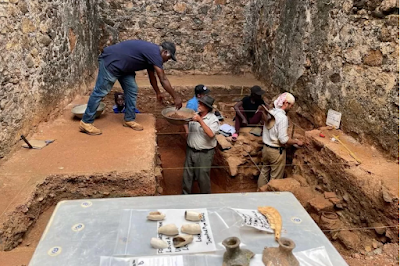A team of archaeologists led by Christopher DeCorse of the Department of Anthropology at Syracuse University have uncovered what they believe to be the site of Fort Kormatine, the first English fort established on the coast of Africa. The remains were uncovered during excavations at a later Dutch settlement, Fort Amsterdam, close to town of Kormantse on the coast of Ghana, about 120 km to the west of Accra. The fort was built in 1631, during the reign of Charles I, and fell to the Dutch in 1665. The exact location of the fort was subsequently forgotten, with Fort Amsterdam eventually being traded back to the British in 1868 (during the intervening time, the England and Scotland had officially become unified as one nation).
The first indications that an older site lay beneath Fort Amsterdam (now part of the UNESCO Forts and Castles, Volta, Greater Accra, Central and Western Regions World Heritage Site) came during an exploratory dig in 2019, which uncovered several seventeenth century European artefacts. The archaeologists returned to the site early in 2023, when excavations restarted. During these excavations, Omokolade Omigbule, a Nigerian graduate student at the University of Virginia uncovered the first stone of what has subsequently turned out to be a six metre long section of wall.
Subsequent excavations at the site have revealed part of the foundations of a building, as well as a doorpost, and a red brick-lined drainage system, as well as an early seventeenth century gunflint, a selection of clay pipe bowls and pottery items, and the jaw of a Goat (taken as evidence that locally sourced domestic Animals were being kept within the fort).
The English occupation of the area spans an important shift in European activities in West Africa. When the fort was built in the 1630s the builders were probably primarily interested in trading for gold and other precious materials, but by the time the English occupation ended, the Company of Royal Adventurers of England Trading into Africa had been granted a charter by King Charles II, giving it the exclusive right to trade slaves from Africa with English colonies in the new world, with the term 'Coromantee' being used by both the English and the Dutch to describe slaves from the coast of the area we call Ghana today.
See also...
Follow Sciency Thoughts on Facebook.
Follow Sciency Thoughts on Twitter.









